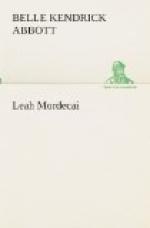“That’s easily done,” he replied. “Every week there are persons going direct to Europe from this very city; and, by the way, my friend Solomon Stettheimer expects to go soon to Wirtemberg, to look after an estate of a deceased relative, and I could safely intrust Leah to his care. I shall write at once to my cousin, the baron, and have her placed under his care.”
“That’s a wise plan, my husband, and will give Leah great joy. Make it known to her as though it was only a pleasant surprise you were offering her, not mentioning the fact that I acquainted you with her wishes.”
“So I will, kind little heart, good little woman that you are,” replied Mr. Mordecai affectionately, as he stroked Rebecca on the arm.
Leah heard no more. Shocked and terrified at this treacherous plotting, she stole softly from the balcony, passed through the side garden, entered the house by the rear door, and hastened away to her own chamber up stairs.
“Merciful Heaven! what a lie, to deprive me of my father’s love, and send me from my home, among unknown friends, so far away! I cannot, cannot go; I cannot leave my father, even though it kill me to remain,” gasped the young girl, in tears and bitterness of heart, as she sank helpless and hopeless upon the snowy bed that stood, a monster ghost, in the moonlit chamber. For hours she lay in silence and in sorrow, and when sleep came at length, the spoken words of her slumber but revealed the burden of her heavy heart in the oft-repeated words, “I cannot, cannot, will not go.”
CHAPTER XX.
A week passed. No word concerning the projected journey had been spoken by her father, and the young girl was beginning to hope that it might have been only the burden of an idle conversation, not a project really determined upon by either parent. But early one morning, as Mr. Mordecai caught the sound of music floating out from the drawing-room-such tender music-he laid aside the paper he was reading, and slipped softly toward the room whence came the sounds. This sudden and unusual manifestation of musical skill, this morning outburst of melody, astonished the father, and his approach to the drawing-room was as much from surprise as for the pleasure of a nearer enjoyment of his daughter’s skilful performance. Unconscious of any approaching footstep, Leah sat, pale and statuesque, at the elegant instrument, and drew forth, at intervals, strains of witching melody. The absorbed expression of her emotionless face told plainly that music was the one channel through which the pent-up feelings of her heart found an outlet. How often is this divine art the unsyllabled expression of a miserable, or an overjoyed heart.
“My daughter,” at length said Mr. Mordecai tenderly, after standing for some moments unobserved behind Leah.
“Is it you, father?” she replied, turning suddenly around, “I did not hear you come in.”




